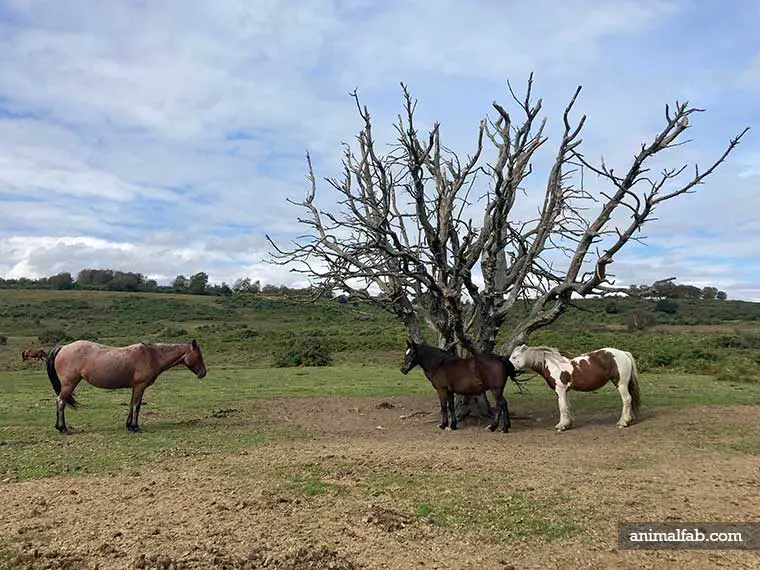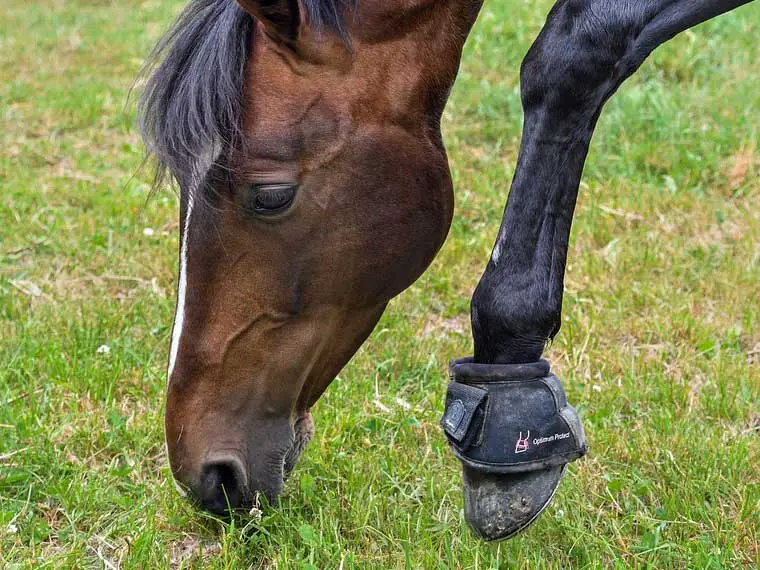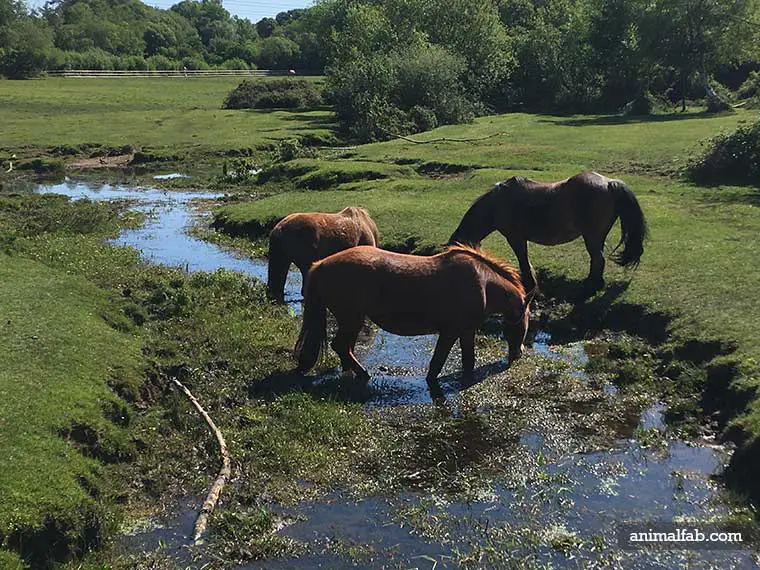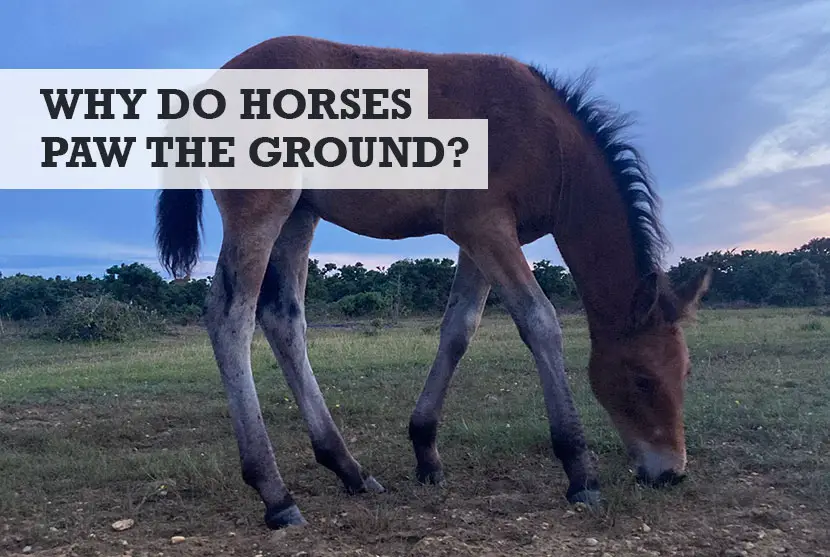Horses exhibit many habits, one of which is their pawing at the ground with their hooves. Although most horses will do this occasionally, some will make it a consistent act – which can even come with long-term consequences.
Why do horses paw the ground? When your horse is pawing the ground, it could mean they are sick, bored, frustrated, or just want attention. However, this undesirable behavior can become detrimental to the horse’s body, surroundings, and mental state if not kept in check.
Do you want to help your horse break this bad habit? Below I will explain how you can identify what it means when a horse is pawing the ground, the reasons horses will default to this action, and how you can help them overcome it before it causes negative side effects.
What is pawing?
Pawing is an arching action in the forelegs performed over and over for an extended period. To someone who is not familiar with this, it may appear as if the horse is attempting to dig a trench into the ground whilst pawing.
All horses will paw the ground at some time or another for several reasons, but if it becomes consistent, it could indicate that the horse is unhappy or not feeling well. It’s also strongly discouraged in the horse community as it could lead to even more problems if left untreated.
Common reasons why horses paw the ground
Pawing has a negative connotation among horse caregivers, but it’s not always bad. For example, some horses paw the ground before they lay down and roll to make the ground more comfortable. Others even strangely paw at water.
Firstly, pawing reasons not to worry about…
Some forms of pawing are purposeful and even necessary for a horse. Here are some reasons a horse will paw that are considered natural and nothing to worry about:
- Digging up roots.
- Splashing water.
- Opening a watering hole.
- Examining an unfamiliar object.
- Softening the ground before lying down.
- Sweeping snow off to forage.
If your horse’s pawing habit is not correlated to one of these reasons, you should pay attention. They may be trying to communicate that something is wrong through their body language.

These are likely reasons why your horse is sending signals by pawing.
1. Colic
Colic is a form of abdominal discomfort in equine that ranges from mild discomfort to severe pain. A horse suffering from colic will display symptoms such as loss of appetite, depression, and of course, pawing at the ground.
Fortunately, more than 80% of colic cases are easily treatable at home without a visit to the vet.
2. Ulcers
Ulcers are slow gastric acid burns inside the body that cause damage to tissues and, in extreme cases, cause internal bleeding. This is extremely painful for horses, and they’ll display their discomfort in the form of pawing the ground.
Common causes of gastric ulcers are lack of forage, acidic pH entering the digestive tract, and stress.
3. Orthopedic discomfort
If a horse is regularly active, it may paw more frequently after exercise to alleviate discomfort in its front legs. After digging small trenches in the ground, they’ll stand in the holes to shift their weight from the front legs to the back.
4. Hunger
Humans are not the only species to become ‘hangry.’ Horses have a surprisingly accurate sense of time. If they’re on a set feeding schedule, they know exactly when they’re supposed to receive their meals.
Handy Hint: Here’s how your horse behaves once he’s bonded with you and trusts you.
Why do horses paw the ground when they eat?
When feeding time draws near, horses may become anxious and display their impatience through pawing the ground before they eat.
If this is a habit your horse develops, I would refrain from feeding them right away. This could enforce the unwanted behavior and cause them to do it whenever they demand food or a snack.

5. Boredom
A lack of activity and mental stimulation can quickly lead to boredom in horses. A bored horse is an unhappy horse, and they may choose to act out by developing a pawing habit.
Since horses only sleep around four hours a day, it’s important to provide activities for them to engage in when they’re awake. Try an interactive toy or let them out of their stall to socialize with herd mates.
6. Excess energy
Horses who are kept in their stalls or small enclosures most of the day will build up tremendous amounts of energy. Without an outlet, they may begin to release this energy and frustration by pawing at the ground.
7. Anger
It’s rare when a horse will express anger through pawing, but it’s not unheard of. In these cases, the pawing is much more forceful, and the horse may pin its ears back.
It could also indicate that they are prepared to attack another horse or a person. Take heed of these signals and take any necessary action immediately – a horse can kill a human being with one kick!
Negative effects of pawing
As I mentioned earlier, consistent pawing at the ground can have adverse consequences on a horse’s physical and mental state. If allowed to persist, these are the ramifications your horse could face.
1. Hoof damage
If a horse paws regularly, it will cause wear and tear to its hooves. Over time, this can result in lameness and other long-term injuries that can be detrimental.
2. Property damage
Horses are powerful creatures, and the physical effort they put into pawing will certainly cause damage to stalls, fences, paddock areas, and trailers. The horse could also get caught on fencing or other objects and hurt themselves if they’re not careful.
Treatment options for pawing
Pawing is a very unwelcome behavior in horses and shouldn’t be ignored. Luckily, there are simple solutions that will encourage your horse to abandon this habit.
Depending on the severity of the pawing, a visit to the vet may be necessary. If you suspect that your horse is pawing due to physical discomfort, I strongly encourage you to make an appointment with your vet so the problem can be accurately pinpointed.
Should any physical causes be eliminated, and the habit continues, you can use these techniques at home to help stop your horse from pawing.
1. Reward training
It’s important to communicate with your horse that pawing is not acceptable behavior. If they’re pawing for attention or food, do not immediately satisfy their demands. This will encourage the horse to continue pawing until it gets what it wants.
Instead, ignore your horse until they have stopped pawing and then offer an award such as their favorite treat or a scratch behind the ear. This is a great form of positive reinforcement that teaches the horse you will not entertain their poor behavior.
2. Adjust the horse’s surroundings
If you notice that your horse is pawing in a certain place, it could be because something in that environment is disturbing them, or they are standing on uneven ground.
Try to identify what could be causing them discomfort. It could be an item or another animal that annoys or scares them. It may also be that they see activity outside of their stall that they want to join.
If your horse is standing on uneven ground in their stall, add boards or bedding to the floor to make the area more comfortable for extended periods of standing.
3. Be positive
I understand how frustrating a horse’s pawing habit can be for you, but don’t allow it to get you down.
Resorting to actions like yelling or implementing punishment will do more harm than good, and it only causes more stress for you and your horse. Stay positive and don’t forget to reinforce good behavior instead of giving attention to bad actions.
Related questions to pawing
Why do horses paw at water?
Horses will paw at water to help open up a water hole, to test how deep the water is, or to check for any hazards before rolling in water. Horses like to roll in water to clean themselves or cool down, so pawing at the water first helps keep them safe.

If you are riding a horse crossing water, be careful. If the animals starts to paw the water, he could be preparing themselves to roll.
Why do horses paw the ground when tied up?
If your horse only paws at the ground when tied up, and no other times, it points towards frustration and stress. It’s like your horse is unhappy at being tied up so is pawing the ground to express that emotion.
What is it called when a horse paws the ground?
There is no official name to describe what it’s called when a horse stomps or paws its foot. However, if it does become a habit, it can be described as a “stereotypy”. This is defined as:
Stereotypies are repetitive behaviors with no apparent goal or function. Common stereotypies include crib-biting, weaving, and stall-walking. The underlying cause of stereotypic behavior in horses remains unclear.
You can read more about these and the research into horse stereotypies on Ker.com.
Why do horses stomp their back feet?
Horses can stomp their back feet to get rid of an irritation such as insects. It could also indicate pain or boredom.
How do I get my horse to stop pawing the ground?
By using my guidance above into what your horse’s pawing means, hopefully you can get to the reason why it’s happening. Once you do, either change the environment or have the horse’s health monitored.
Conclusion
Have you ever struggled with habits that are difficult to break like biting your nails or cracking your joints? You’re not alone!
Many animals develop mannerisms that can be difficult to overcome, and horses are no exception.
As you can now understand, when horses paw the ground, it can mean many things. Most are benign, but occasionally it could mean something more serious.

